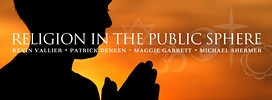Historians should never make predictions, especially about the future, given how messy the past can be. But scientists can and do make predictions based on historical trends (assuming they continue), and the trendlines for the gay rights revolution that is unfolding dramatically on a daily basis in the form of same-sex marriage laws enacted now in 31 states (the number could change by the time I get to the end of this paragraph) lead me to make a prediction.
I predict that within five to ten years Christians will come around to treating gay men and lesbians no differently from how they now treat other groups whom they previously persecuted—like women, Jews, and blacks. This change will not occur because of some new interpretation of a biblical passage or because of a new revelation from God. It will come about the same way that such changes always do: by the oppressed minority fighting for the right to be treated equally, and by enlightened members of the oppressing majority supporting their cause. Then Christian churches will take credit for the civil liberation of the gay community, rummage through the historical record, and find those preachers who had the courage and the character to stand up for gay rights when their fellow Christians would not. They will then cite those preachers as evidence that, were it not for Christianity, gay people would still be in the closet. This is what happened after the abolition of slavery, and it is already beginning to happen now with the gay rights movement.

